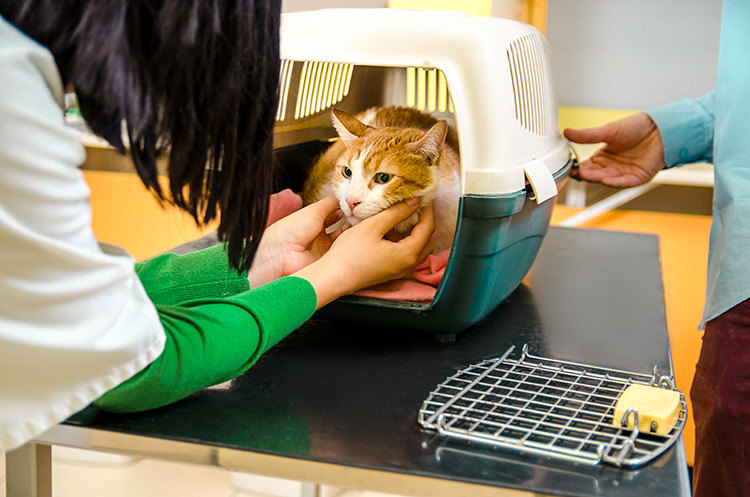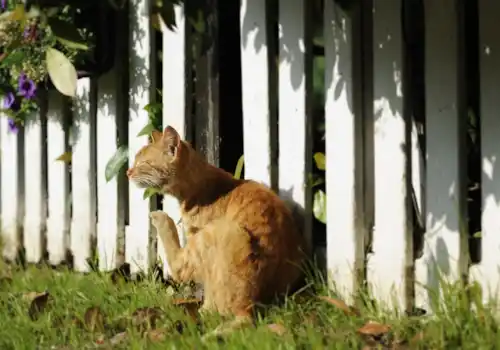Putting a cat to sleep is an incredibly hard decision. When is the right time to euthanise, and what happens when you put a cat to sleep?
- When is the right time to put your cat to sleep?
- Questions to ask before you put your cat to sleep
- What happens when a cat is put to sleep?
- Can you stay when your cat is being put to sleep?
- Can you have your cat put to sleep at home?
- What happens after your cat is put to sleep
- Coping with the death of your cat
- FREE Bereavement e-book
- Getting another cat after the death of a cat
Euthanasia, or having a cat put to sleep, is a difficult issue that is never easy to deal with and is always emotive.
Most vets would agree that it is not the length of a cat's life that is of prime concern but the quality of his life. There is obviously no necessity to put down cats because they are old - cats will age at different rates.
Similarly, there is no need to put a cat to sleep simply because a terminal condition such as cancer has been diagnosed - the cat may well be able to live several more happy months.
However, when your cat is suffering from extreme pain which is difficult to control, your vet may suggest that euthanasia is the kindest option. Taking the decision to have your cat put to sleep is one that shouldn't be taken lightly, and the advice of your vet will be invaluable in making the right choice. When there is no reasonable alternative, to enable a cat to die in peace and dignity can be a tremendous relief.

When is the right time to have my cat put to sleep?
From a vet's point of view, giving advice depends upon a delicate balance of clinical judgement and counselling skills, because the decision is usually not cut and dried. The primary consideration is almost always the welfare of any animal - although owner considerations may also play a role.
Usually it is a matter of deciding when a cat is no longer getting enjoyment from his life, and this is a very subjective judgement.
Sometimes, it is so obvious that the cat is in intolerable discomfort that euthanasia is the only kind option, but more often the deterioration is gradual, and a line has to be drawn. Many owners hope that their pet will peacefully slip away in their sleep, so that the fateful decision is taken out of their hands. Putting off a decision is understandable but is often not in the best interests of the cat and can result in feelings of regret and guilt.
Questions to ask before you have your cat put to sleep:
If the answer to one or more of these questions is 'yes', then you should be discussing the possibility of euthanasia with your vet and with other members of your family who have an involvement.
- Is my cat obviously showing signs of continual or recurring pain?
- Has my cat stopped eating or drinking?
- Has my cat stopped following a reasonably normal pattern of behaviour?
- Has my cat stopped interacting with me normally and showing signs of contentment?

What happens when a cat is put to sleep?
The process of putting a cat to sleep is straightforward. It involves a vet giving your cat a large overdose of an anaesthetic agent that will simply cause the cat to lose consciousness and pass away very rapidly. This is usually given by intravenous injection using a vein in the front leg.
Unconsciousness and death usually occur within seconds of the injection being administered. Sometimes, as the cat loses consciousness, he will take a deep breath or gasp and exhale loudly. Occasionally there may be some involuntary twitching for a few moments after death has occurred, but this isn't a sign of life.
Euthanasia carried out in this way is quick, controlled, stress-free and painless. If the vet sees that a cat is very nervous, a sedative may be administered to calm your cat down prior to euthanasia, to ensure that his final moments are completely free of any stress.
Can I stay with my cat when he is put to sleep?
The choice is with the owners as to whether they stay with their pet or leave him alone with the vet. Don't feel guilty, however, if the situation is too distressing and you have to leave the room. The best advice, if you stay with your cat, is to try your best not to get too upset at first, as this can be picked up by your pet.
Can I have my cat put to sleep at home?
Some vets will euthanase a pet at home, but this is something that you will need to speak to your individual vet about. There are also a number of mobile vets specialising in at-home euthanasia - speak to your vet about this option. If you do go to the vets, be sure to tell the receptionist that you would like to schedule the appointment at a time when the vet is not in a hurry with other appointments or surgery. You might even request that your appointment be the last one of the day or the first one in the morning.
Read more about ways of remembering your cat here.
What will happen to my cat after he is put to sleep?
There are several options that your vet will be able to arrange depending on your wishes:
- You may choose cremation and leave the cat with the vet to undertake.
- You can take your cat for burial at home in your garden.
- You may choose burial in a pet cemetery - your vet can help to arrange this.
- Your vet can arrange for an individual cremation with return of the ashes - although relatively expensive, this is another service that your vet can organise.
How do I cope with the death of my cat?
Many pet owners experience a very strong and lasting sense of pain and grief after the passing of a special pet, and it may be difficult to find friends who understand what you are going through. This can be a very lonely and private grief since the pet owner is often reluctant to disclose the source of their saddened state for fear of ridicule.
Plus, it is very common for the pet owner to think they see or hear their deceased pet in the home or out in the garden long after he is gone. If someone hasn't personally experienced the loss of a loved pet they may not be able to fully connect with the pet owner who is grief stricken.
Read more about how to cope with the death of a cat here.
When should I get another cat?
If you're a 'cat person' you are bound to feel strange living in a cat-free home. Sooner or later your thoughts will stray to the possibility of welcoming another cat into your life. Is there a right time to look for another cat? How soon should you offer a home to another playful kitten or needy rescue cat? Should you leave a decent interval of mourning for the lost one, and how long should this be? And is it disloyal to your old cat even to contemplate loving another.
Research shows that two-thirds of bereaved pet owners were actively looking for a new animal within two weeks of the old one's death.
Psychologist June McNicholas says some people talk about 'replacing' a pet when, of course, that isn't what you are doing. Cat owners can miss the experience of owning a cat as much as missing their actual pet.
Read more about whether it's possible to love another cat after losing one.
Choosing a new cat
June says: "Some people will need time to get over one relationship before starting another. Others, especially those who adopt rescue cats, feel that they are transferring some of their love to another animal that needs it. In many cases, choosing and learning to bond with another cat can be therapeutic, as long as you don't try to find an identical one. At first you might unconsciously compare them, but gradually you find that the new cat has endearing little ways all of its own."
In short there is no right time to get another cat. You will know yourself when the time is right. There are people who say they couldn't go through the bereavement again, but isn't it better to remind yourself there's a cat out there who needs the loving home you can offer?
The Your Cat Guide to Bereavement e-book
If you need more help with bereavement, you may find some useful advice and comfort from our e-book. The Your Cat Guide to Bereavement covers everything from how to cope with the death of a cat, to learning to love again.
Want more cat care advice like this?
Sign up to our FREE weekly newsletter for further cat care advice, tips, competitions, latest news and updates, plus much more! Sign up here.









